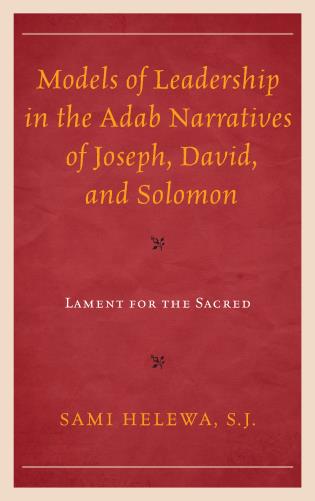Helewa (Sami), Models of Leadership in the Adab Narratives of Joseph, David, and Solomon : Lament for the Sacred, Lanham, Lexington Books, 2017, 234 p. ISBN 978-1-4985-5266-0
L’auteur
Sami Helewa, S.J., was born and raised in Lebanon where he completed his first studies. He came to Canada in 1981 and enjoyed a career in the financial sector after he completed his undergraduate studies (B.Sc 1986) at the University of Toronto, and became also an editor to G-7 Report in international economics. After he completed his M. Divinity at Regis College (University of Toronto) he entered the Society of Jesus in 1998. Since then, he completed Special studies in Philosophy (2002) at University of Toronto, M. Theology and S.T.L (Weston Jesuit School of Theology, Cambridge MA, 2006), MA in religious studies at University of Toronto (2008) and a PhD in Islamic studies (University of Edinburgh, 2012). Sami is not a stranger to Campion College since during his regency he served as a chaplain and an assistant lecturer between 2002 and 2004. His research interests entail Islamic religious narrative both as a historiography and Qurʾānic exegesis, Islamic familiarity with Judaic and Christian narrative, Arabic, and Arabic narratives in translation. Dr. Helewa lectures and works in various capacities : Islam and world religions in the department of religious studies ; Arabic in the department of international languages ; director of the Catholic Studies at Campion. He is currently working to publish his doctoral thesis. (Source : http://campioncollege.ca)
Presentation

Qiṣaṣ al-anbiyāʾ (Tales of the Prophets) in terms of the leadership of ancient prophets in a Muslim context of friendship and enmity in the narrative detail of the prophets Joseph, David, and Solomon. Although the Qiṣaṣ genre is not court-based, advice literature, these tales could function as advisory literature through the legendary-prophetic figures. It is hardly surprising that the prophets of ancient times have been moral prototypes for the Judo-Islamic search for religio-political leaders. However, the themes of leadership, friendship, and enmity are embedded in these tales in the writing of great Medieval-Muslims like al-Ṭabarī of Baghdād and al-Thaʿlabī of Nīshāpūr, who were great scholars (ʿulamāʾ) and men of literature (ʾudabāʾ). Like the religious side of these tales, Helewa maintains that the adab side of the Qiṣaṣ has equal importance of meaning to the struggle of ancient prophets in their friendships and hostilities. These tales, as astutely compiled from Baghdād and Nīshāpūr, mirror interesting cultural nuances of expected leadership inherent in these great cities of learning. This book will be a great value for those interested in the Sīra genre, the overall Qiṣaṣ genre, the inheritance of prophets, the adab of religious writing, the advice literature, and the history of Baghdād and Nīshāpūr.
